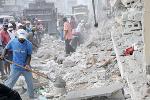Haiti Wants to ‘Change the Narrative About the Country. OK, Start with COVID Vaccines
Haiti has many surnames including "Poorest Country in the Western Hemisphere", "Republic of 10,000 NGOs, and "at a Crossroads". For all is beauty and potential, it remains held back by poor governance, political intsability, and crushing poverty. It's a hard narrative to change when most of the coverage is of flawed elections (or no elections), power struggles, and protests. If the Haitian government truly wants to change how it is viewed it needs to show that it cares about and invests in its own people. The Miami Herald Editorial Board recommends starting with COVID vaccination - which has not yet taken place. It would be a start.









